Tag: primary sources
Primary Sources: Latin American Anarchist and Labour Periodicals (c. 1880-1940) Online
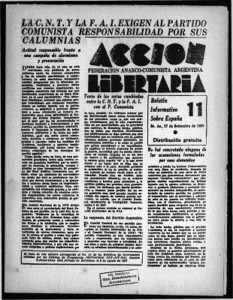 The Library has recently acquired Latin American Anarchist and Labour Periodicals (c. 1880-1940) Online, a collection of 971 titles held at the International Institute of Social History (IISH) in Amsterdam. As described on the website, the “collection contains numerous rare, and in many cases unique, titles. It consists of periodicals accumulated by the Austrian anarchist, historian and collector Max Nettlau (1865-1944), together with a number of later additions. Included, among many others, are the Argentine periodicals La Protesta, La Vanguardia and Acción Obrera; the Brazilian O Exempio, Jornal do Povo and Battaglia; the Chilean Voz del Mar; and the Mexican Ariete, Redención Obrera, Revolución Social and El Sindicalista.”
The Library has recently acquired Latin American Anarchist and Labour Periodicals (c. 1880-1940) Online, a collection of 971 titles held at the International Institute of Social History (IISH) in Amsterdam. As described on the website, the “collection contains numerous rare, and in many cases unique, titles. It consists of periodicals accumulated by the Austrian anarchist, historian and collector Max Nettlau (1865-1944), together with a number of later additions. Included, among many others, are the Argentine periodicals La Protesta, La Vanguardia and Acción Obrera; the Brazilian O Exempio, Jornal do Povo and Battaglia; the Chilean Voz del Mar; and the Mexican Ariete, Redención Obrera, Revolución Social and El Sindicalista.”
This resource has been added to the Latin American History guide.
Primary Sources: The Archives of the Church in North India: Archival Collection
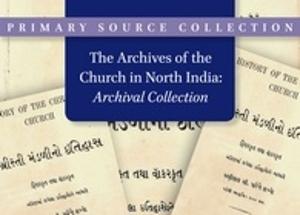 The recently acquired collection of The Archives of the Church in North India: Archival Collection is described on their website as follows: “A collaboration with Yale University, the online version of The Archives of the Church in North India comprises archival and printed material from the Gujarat Diocese of the Church of North India. The Archival collection includes:
The recently acquired collection of The Archives of the Church in North India: Archival Collection is described on their website as follows: “A collaboration with Yale University, the online version of The Archives of the Church in North India comprises archival and printed material from the Gujarat Diocese of the Church of North India. The Archival collection includes:
- Minutes of meetings, correspondence and other documents of the Irish Presbyterian Mission Council in Gujarat and relevant local committees.
- Annual reports prepared by the Irish Presbyterian Mission Council that describe the achievements of the past year, including information about the financial situation of the IP Mission from 1851 to 1965.
- Annual reports of the Missions’ Orphanage from 1870 till 1958.”
Primary Sources: Confidential Print: North America, 1824-1961
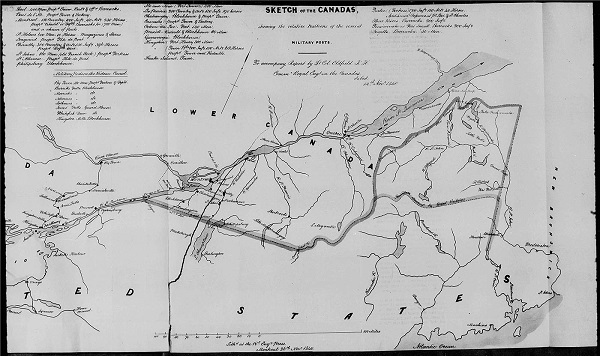
Beginning in the 1820s, the Confidential Print series was a selection of key correspondence, orders, policy documents, treaty texts, and memoranda from Great Britain’s Foreign Office and Colonial Office distributed internally to the Monarchy, Cabinet, members of Parliament, and within their organizations. Confidential Print: North America sheds light on controversies surrounding slavery, the treatment of Canadian indigenous peoples, uprisings against colonial rule, labor unrest in the United states, Nazi and fascist activities in Latin America, and much more. The record groups included in this series of Confidential Print are:
CO 880 War and Colonial Department and Colonial Office: Confidential Print North America, 1939-1914
CO 884 War and Colonial Department and Colonial Office: West Indies, Confidential Print 1826-1961
FO 414 Foreign Office: Confidential Print North America, 1824-1941
FO 461 Foreign Office: Confidential Print America, 1942-1956
FO 462 Foreign Office: Confidential Print United States of America, 1947-1956
More details about the contents of these record groups can be found in the Nature & Scope page of the site.
Primary Sources: Women at Work during World War II: Rosie the Riveter and the Women’s Army Corps
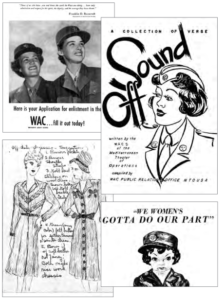 A new Library acquisition is Women at Work during World War II: Rosie the Riveter and the Women’s Army Corps. This module contains two major sets of records documenting the experience of American women during World War II: Records of the Women’s Bureau of the U.S. Department of Labor, and Correspondence of the Director of the Women’s Army Corps. Primary sources document a wide range of issues pertinent to women during this time of turbulent change, including studies on the treatment of women by unions in several midwestern industrial centers, and the influx of women to industrial centers during the war. Topics covered in records and correspondence include women’s work in war industries, pivotal issues like equal pay, childcare and race, and extensive documentation on the women who joined and served in the Women’s Army Corps as WACs.
A new Library acquisition is Women at Work during World War II: Rosie the Riveter and the Women’s Army Corps. This module contains two major sets of records documenting the experience of American women during World War II: Records of the Women’s Bureau of the U.S. Department of Labor, and Correspondence of the Director of the Women’s Army Corps. Primary sources document a wide range of issues pertinent to women during this time of turbulent change, including studies on the treatment of women by unions in several midwestern industrial centers, and the influx of women to industrial centers during the war. Topics covered in records and correspondence include women’s work in war industries, pivotal issues like equal pay, childcare and race, and extensive documentation on the women who joined and served in the Women’s Army Corps as WACs.
Primary Sources: FBI Confidential Files and Radical Politics in the U.S., 1945-1972
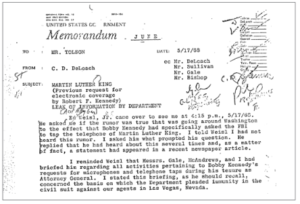 Another recent acquisition of the Library is the ProQuest History Vault module, FBI Confidential Files and Radical Politics in the U.S., 1945-1972. Under the leadership of J. Edgar Hoover, the FBI vigorously investigated and tracked the activities of Communist groups, Communist-front groups, and other radical organizations in the U.S. This module consists of records of the FBI and the Subversive Activities Control Board from 1945-1972.
Another recent acquisition of the Library is the ProQuest History Vault module, FBI Confidential Files and Radical Politics in the U.S., 1945-1972. Under the leadership of J. Edgar Hoover, the FBI vigorously investigated and tracked the activities of Communist groups, Communist-front groups, and other radical organizations in the U.S. This module consists of records of the FBI and the Subversive Activities Control Board from 1945-1972.
Highlights of this module include J. Edgar Hoover’s office files; documentation on the FBI’s so-called “black bag jobs,” as they were called before being renamed “surreptitious entries”; and the “Do Not File” File. The “Do Not File” file consists of records that were originally supposed to be destroyed on FBI Director J. Edgar Hoover’s order, however, through both intended and inadvertent exceptions to this order, large portions of these files survived. Another key collection in this module consists of the records of the Subversive Activities Control Board (SACB). The SACB files constitute one of the most valuable resources for the study of left-wing radicalism during the 1950s and 1960s.
Primary Sources: Southern Life and African American History, 1775-1915, Plantation Records, Part 2
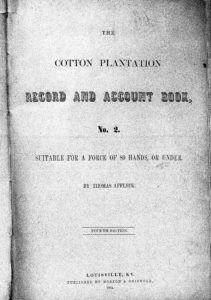 The Library has recently acquired the second set of Plantation Records in ProQuest History Vault. The records presented in this module come from the University of Virginia and Duke University. Major collections from the holdings of the University of Virginia include the Tayloe Family Papers, Ambler Family Papers, Cocke Family Papers, Gilliam Family Papers, Barbour Family Papers, and Randolph Family Papers. Major collections from the Duke University holdings document plantation life in the Alabama, as well as South Carolina, Georgia, North Carolina, Virginia, and Maryland.
The Library has recently acquired the second set of Plantation Records in ProQuest History Vault. The records presented in this module come from the University of Virginia and Duke University. Major collections from the holdings of the University of Virginia include the Tayloe Family Papers, Ambler Family Papers, Cocke Family Papers, Gilliam Family Papers, Barbour Family Papers, and Randolph Family Papers. Major collections from the Duke University holdings document plantation life in the Alabama, as well as South Carolina, Georgia, North Carolina, Virginia, and Maryland.
Trial: Women and Social Movements in Modern Empires since 1820
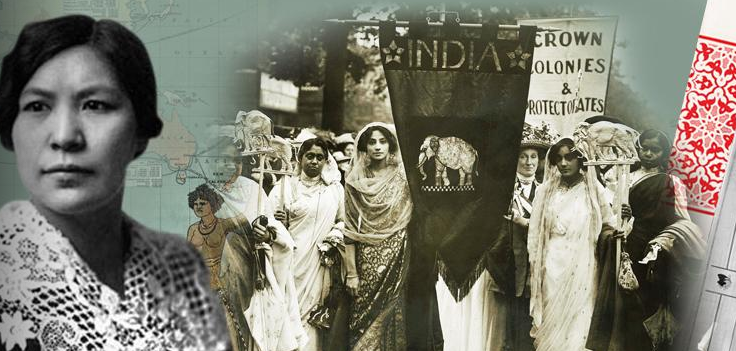
Through April 18, 2017, The Library has a trial of Women and Social Movements in Modern Empires since 1820, a supplement to Women and Social Movements, International. Documents included in this digitized resource explore prominent themes in world history since 1820: conquest, colonization, settlement, resistance, and post-coloniality, as told through women’s voices.
For more information about the content included in this collection, click HERE.
Trial: Four primary source modules from ProQuest
The Library will soon be acquiring four additional primary source collections from ProQuest. In the meantime, we have set up trial access to them until March 16.
FBI Confidential Files and Radical Politics in the U.S., 1945-1972
Southern Life and African American History, 1775-1915, Plantation Records, Part 2
Confidential U.S. State Department Central Files, Africa and Middle East, 1960-1969
Women at Work during World War II: Rosie the Riveter and the Women’s Army Corps
Primary Sources: Foreign Office Files for the Middle East (updated)
The Library now has all three modules of the online resource Foreign Office Files for the Middle East, which include 1971-1974: The 1973 Arab-Israeli War and the Oil Crisis; 1975-1978: The Lebanese Civil War and the Camp David Accords; and 1979-1981: The Iranian Revolution and the Iran-Iraq War.
The content is sourced from the British Government records at the UK National Archives. The following Foreign and Commonwealth Office file classes are included in their entirety:
CO 935/1-25 Middle East General, 1920-1956
FO 402/1-33 Afghanistan, 1922-1957
FO 406/1-84 Eastern Affairs (Middle East), 1812-1946
FO 407/1-237 Egypt/Sudan, 1839-1958
FO 416/1-113 Persia, 1899-1957
FO 423/1-70 Suez Canal, 1859-1947
FO 424/1-297 Turkey, 1841-1957
FO 437/1-9 Jordan, 1949-1957
FO 464/1-12 Arabia, 1947-1957
FO 481/1-17 Iraq, 1947-1969
FO 484/1-11 Lebanon, 1947-1957
FO 487/1-11 Middle East General, 1947-1957
FO 492/1-11 Israel/Palestine, 1947-1957
FO 501/1-10 Syria, 1947-1956
Selections from the Prime Minister’s Office files (PREM) and Defence Intelligence files (DEFE) are also included.
Primary Sources: British Poor Schools in the Nineteenth Century, 1812-1901
Recently added to our collection of British Online Archives are the reports of British Poor Schools in the Nineteenth Century, 1812-1901. The compiled reports were printed and then microfilmed — this resource is a digitized version of the microfilm.
These reports cover the history of poor schools and the societies that ran them in Britain, including schools from the Anglican and Wesleyan denominations as well as secular and Catholic schools, and chart the rise of education for the poor from the industrial revolution to the Victorian era.